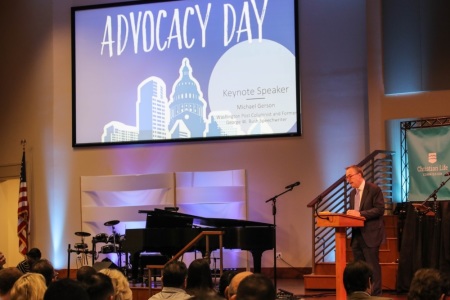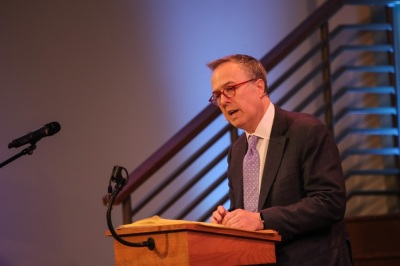Can Christians get political without hurting the Gospel message?

AUSTIN, Texas — Christians involved in politics today face three difficult trends, Michael Gerson argued.
Polarization, confirmation bias, and dehumanization present challenges for all Americans, and Christians should counter, rather than contribute to these problems, Gerson, a conservative Washington Post columnist, said in the Tuesday keynote address for Advocacy Day, a Baptist General Convention of Texas conference to educate Christian Texans on involvement in politics.
Gerson began by telling the audience that political advocacy, while important, is not the most important type of advocacy for a Christian.
"The most profoundly positive and powerful form of advocacy is advocacy for the Gospel of Jesus Christ, and the gates of Hell shall not prevail against you," he said.
Polarization
"We live in a landslide country," Gerson explained, where most of us live in areas where either Republicans or Democrats easily win in landslide elections. In 2016, he noted, 80 percent of counties voted for either Trump or Clinton in a landslide. In the 1970s, that number was 25 percent for presidential elections.
This leads to many of us living in a bubble, where we interact little with people who vote differently.
"We live increasingly in homogenous political communities, in silos of the mind," he said.
Gerson pointed to a 2016 report by Pew Research Center.
In describing one of the findings of the report, Gerson quoted former Pew Vice President Paul Taylor, who wrote: "These days Democrats and Republicans no longer stop at disagreeing with each other’s ideas. Many in each party now deny the other’s facts, disapprove of each other’s lifestyles, avoid each other’s neighborhoods, impugn each other’s motives, doubt each other’s patriotism, can’t stomach each other’s news sources, and bring different value systems to such core social institutions as religion, marriage and parenthood. It’s as if they belong not to rival parties but alien tribes."
To resist this polarization, Gerson said, Christians "must start with an adjustment of attitude" by loving those on both sides of our polarized life.
This means Christians need to learn how to be doorkeepers and "to live on the edge of the inside," Gerson said, quoting Franciscan author Richard Rohr.
Rohr wrote: "To live on the edge of the inside is different than being an insider, a 'company man,' or a dues paying member. Yes, you have learned the rules and you understand and honor the system as far as it goes, but you do not need to protect it, defend it, or promote it. ... A doorkeeper must love both the inside and the outside of his or her group, and know how to move between these two loves."
Confirmation bias
One of the most "unsettling" findings in political science, Gerson continued, is "the more knowledge that political partisans have, the more stubborn they become in their ideological beliefs."
Those with little political knowledge aren't the biggest problem in American politics, Gerson contended, "it's people who use their brainpower to support the views of their tribe."
To counter this problem, Christians should to "be willing to call out your own side, to make a fair judgment no matter who it benefits ... it is different and powerful to police your own.

"Be an activist, be partisan, but show some intellectual honesty. It is has never been more important."
Additionally, Gerson said, Christians need to recognize and confront their own confirmation bias.
"It's sometimes difficult for me, to be honest, to praise good and important things accomplished by this administration," he admitted. "All of us have the tendency to see an enemy when we really need a mirror."
Dehumanization
The third challenge for Christians to confront in their political involvement is dehumanization.
"Dehumanization has become part of our public discourse, refugees have been referred to as animals, Mexican migrants have been called rapists, Muslims are treated as essential threats, Jews are tagged with ancient stereotypes," Gerson said.
And dehumanizing language from political leaders influences the beliefs of their constituents. Gerson cited a study from Hungary showing that after a right-wing populist government took control and used anti-immigrant rhetoric, the number of those who believed migrants were less human (on an evolution chart) increased.
To counter this problem, Gerson said, we need to practice empathy. "A failure of empathy is ultimately a moral and spiritual matter."
Evangelicals and Trump
Speaking of his own religious tradition, evangelicalism, Gerson pointed out where the Church is failing to meet these challenges, and has often contributed to the problems.
"Under legal and moral siege by the forces of secularism, now, in this view, [evangelicals] must find political allies and fight back before they are thrown to the lions," Gerson said, explaining why many evangelicals have supported President Donald Trump.
"This attitude is, perhaps, politically and psychologically understandable from any group that has lost cultural standing, but it has absolutely nothing to do with the Sermon on the Mount, nothing to do with any recognizable version of Christian ethics in 2,000 years of history. The very thing that should repel evangelicals, the dehumanization of others, is sometimes what seems to be what fascinates and attracts them, and that is the worst kind of discrediting hypocrisy."
By aligning evangelicalism with misogyny, bigotry and nativism, Gerson continued, evangelicals have undermined their pro-family, pro-religious freedom and pro-life messages.
"It's not the mission of the Christian church to be popular in the culture," he said, "and threats to religious liberty are very real in this country ... but identifying evangelicalism with ... one populist nativist party has serious dangers.
"Public influence ultimately depends on the persuasiveness of public arguments. Pro-life arguments are discredited by association with misogyny. Arguments for religious liberty are discredited when we say Muslims shouldn't have any religious rights. Arguments for family values are discredited by nativist disdain for migrant family structures.
"And the ultimate harm here is the reputation of faith itself. Civic engagement is, in some ways, one face of the Church to the world, and it is a grave matter when that face is a snarl or a sneer."
4 areas where Christians can make a difference
Our nation needs healing, truth and humanization to meet the challenges of polarization, confirmation bias and dehumanization, Gerson said, and there are four areas where Christians have the tools to make a difference.
First, Christians need a biblical understanding of human dignity.
Pastors shouldn't feel the need to weigh in on every political issue, Gerson says. Debates, for instance, on illegal immigration are mostly prudential, not moral. There is no Christian position on whether to build a wall. However, pastors "have a solid moral duty to oppose the dehumanization of migrants in any circumstance, something that violates the vision of human dignity and equality at the heart of the Christian faith."
Second, Christians should be committed to the common good.
Christianity is individualistic, Gerson said, but it's also communitarian, as illustrated by the Golden Rule.
Christians should advocate for a "set of social circumstances that allows everyone to flourish."
Third, Christians need a correct understanding of the Kingdom of God.
"The proper role of Christians in politics, Gerson said, is not to christianize America, it is to demonstrate Christian values in the public realm. ... This brings a kind of influence that does not depend on a welcome at the White House."
And fourth, Christians must "remember our history." By looking at the examples of previous Christians who faced similar challenges, we can gain a better perspective of our own place and time.
"We've had a taste of nihilism and chaos, looked into the abyss, and we know this cannot be our destination," Gerson concluded. "I'm confident in the long run that people will choose decency and shared progress ... or so I try to believe.
"When people, including modern cynical people, see the image of Jesus even partially reflected in another human being, it appeals across every distinction, every division, every boundary. It stirs the deepest longings of the human heart. And when the representatives of Christ act like Jesus, truth and influence returns."
Shirley Hoogstra, president of the Council for Christian Colleges and Universities, was in attendance and led a workshop on religious freedom. She praised Gerson's speech in and interview with The Christian Post.
"When I listen to [Gerson] I am both inspired and humbled. And I hope that we can engage his ideas on a broad scale because we want an America that we can be proud of for our children and grandchildren," she said.
Advocacy Day had about 200 attendees. The Texas Baptists, or the Baptist General Convention of Texas, is an affiliation of 5,300 churches in Texas from a broad spectrum of Baptist denominations.
On Wednesday, attendees visited offices in the Texas legislature to talk about their priorities, which included, according to a 26-page policy guide all attendees received, children and families, human trafficking, immigration, religious liberty, poverty, and life.





















